⚠️ Did you get an email saying “I infected you with a RAT” with threats about private videos? This is a scam known as “Sextortion“.
What the email says: It claims that a RAT malware, a real type of cyber threat, has been put on your computer. The scammer says they can see everything on your computer and have recorded you with your webcam. They threaten to send these videos to your contacts unless you pay them in Bitcoin.
But here’s the truth: These scary claims are not true. The scammers are trying to scare you into giving them money without having any real video or evidence.
Here’s an example of the “I infected you with a RAT” email:
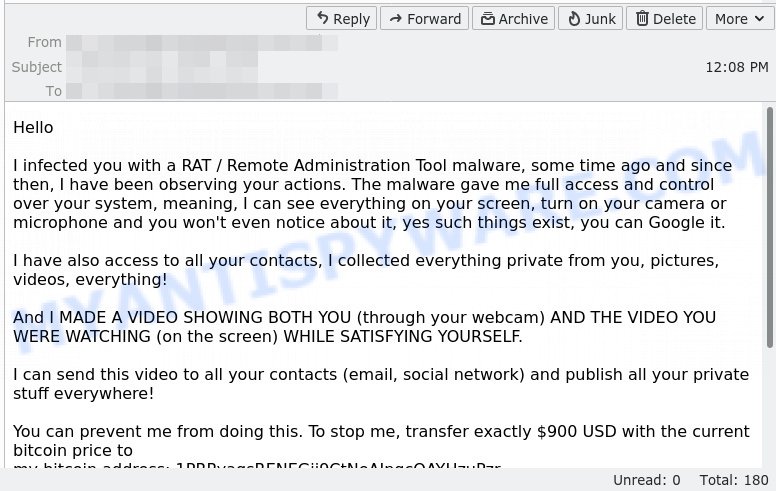
The “I infected you with a RAT Email Scam” uses fear to trick people. Remember, paying these scammers doesn’t keep you safe; it just shows them you’re an easy target for more scams. Always be careful with emails that ask for money or personal info. Keep your computer’s security updated and be cautious. Knowing about these scams and being careful is the best way to protect yourself online.
Table of Contents
Is this a scam email?
Yes, the email that says “Hello, I infected you with a RAT / Remote Administration Tool malware” is a scam. 🚫 If you got an email that threatens to expose private information or videos of you unless you pay money, be very careful. These threats are made up and aim to scare you into sending money for no real reason.
Here’s what the scam email might say:
- I secretly put malware on your devices and have been watching you.
- I’ve made videos of you doing private things and will send them to everyone you know if you don’t pay up.
- You need to send $900 USD in Bitcoin to my wallet to stop me from sharing these videos.
- Don’t try to go to the police or mess with your devices, or I’ll share the videos right away.
- I sent this from a throwaway email, so don’t reply.
The email uses fear and threats to rush you and make you scared. 🚨 The real goal? To trick you into sending money without any real proof that these videos exist. These scammers count on you feeling too embarrassed or panicked to think clearly.
🚩 Signs This Email Is a Scam:
Be on the lookout and question the truth of such emails if you see these signs. 🔍🛡️
- 📧 Scary Messages: Emails that threaten you and say they have embarrassing info about you.
- 🔗 Asking for Bitcoin: The scammer wants payment in Bitcoin to use its secrecy.
- ⏳ Pressure to Act Fast: The email might give you a short deadline to make you act quickly out of fear.
- 🖼️ Says There’s Malware: Doubt emails that claim they’ve put advanced spyware on all your devices without any proof.
- ✍️ Threatening Words: These emails often use clear threats to say they’ll share private info with your contacts.
- 👤 Unknown Sender: The scammer usually uses a disposable or hidden email to stay anonymous.
- 🔄 No Real Proof: If there were real claims, they’d likely show some evidence, but scammers just use threats with no real proof.
Understanding the ‘I infected you with a RAT’ Email Scam
If you get an email that says “I infected you with a RAT“, it’s normal to feel worried 🚨. These emails usually start with shocking claims meant to get your attention right away. You might think, “How could they get into my computer?” Typically, the person sending the email doesn’t actually have any of your personal information; they’re just trying to scare you and make you act quickly.
These emails make unfounded threats, saying they have videos or other sensitive information that could embarrass you 🎥. The language is deliberately unclear and scary, designed to make you anxious: “Could any of this be real?”
The scammer may say they’ve put complex malware, like a Remote Administration Tool (RAT), on your device, claiming they can see everything you do online 💻. A big sign that this is a scam is that they don’t provide any real proof 🚩. They’re trying to use the idea of having advanced technology to scare you, not actual hacking skills.
The email usually ends with a request for money 💰, with the scammer asking for a ransom in Bitcoin because it’s hard to trace. The scam is designed to make you feel pressured to pay quickly. But paying doesn’t make you safe and could even make you a target for more scams.
When you read the email, you might wonder, “Am I really at risk?” or “Can this person really do what they’re saying?” In most cases, these threats aren’t real; they’re just trying to play on your fears.
What should you do? It’s best not to reply to the scammer or pay any money. Focus on keeping yourself safe online: change your passwords, make sure your devices are secure, and think about telling the police if the scam involves threats or demands 🔐. This kind of situation shows why it’s important to always be careful and take steps to protect yourself online.
The email read as follows:
Hello
I infected you with a RAT / Remote Administration Tool malware, some time ago and since then, I have been observing your actions. The malware gave me full access and control over your system, meaning, I can see everything on your screen, turn on your camera or microphone and you won’t even notice about it, yes such things exist, you can Google it.
I have also access to all your contacts, I collected everything private from you, pictures, videos, everything!
And I MADE A VIDEO SHOWING BOTH YOU (through your webcam) AND THE VIDEO YOU WERE WATCHING (on the screen) WHILE SATISFYING YOURSELF.
I can send this video to all your contacts (email, social network) and publish all your private stuff everywhere!
You can prevent me from doing this. To stop me, transfer exactly $900 USD with the current bitcoin price to
my bitcoin address: 1PRRyaqsRENEGjj9CtNeAJnqcQAYHzuPzrYou know this all isn’t a joke, you got the proof above. I think it’s a very good price compared to the damage and hell it can bring into your life!
After receiving the payment, I will delete everything from you and you can life your live in peace like before. I give you 2 days to get the bitcoins.
Basically, this scam is all about using fear and pressure to trick you. If you get an email like this, don’t talk to the scammer or send any money. Just delete the email. Also, make sure your computer is protected with up-to-date anti-virus software, and use strong, different passwords for all your accounts to help avoid falling for scams like this.
Examples of such scams
Scammers have developed a variety of tactics to intimidate and exploit unsuspecting individuals. Here are a few common examples:
📹 I RECORDED YOU Email Scam
In this scam, the sender claims to have control over your camera and alleges they have recorded you during private moments. They typically demand payment to keep the footage private. Beware: this is a bluff to get you to pay up out of fear.
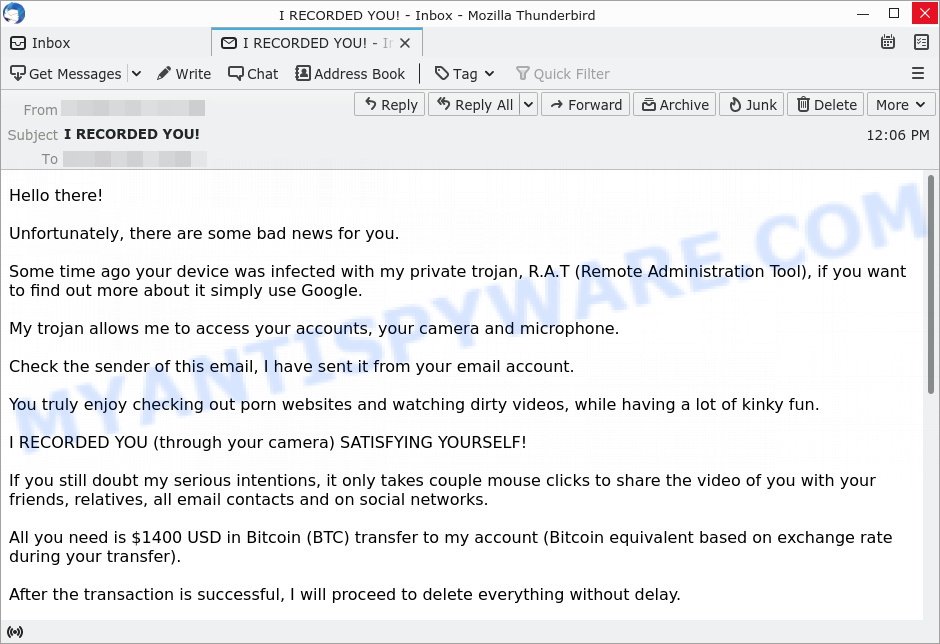
💼 I am a professional hacker EMAIL SCAM
Posing as a hacker, the sender of this email might say they’ve infiltrated your system. They may even claim they have proof of embarrassing activity and will publish it unless you send them money. Remember, a real hacker wouldn’t announce their presence—it’s a tactic to pressure you into paying.
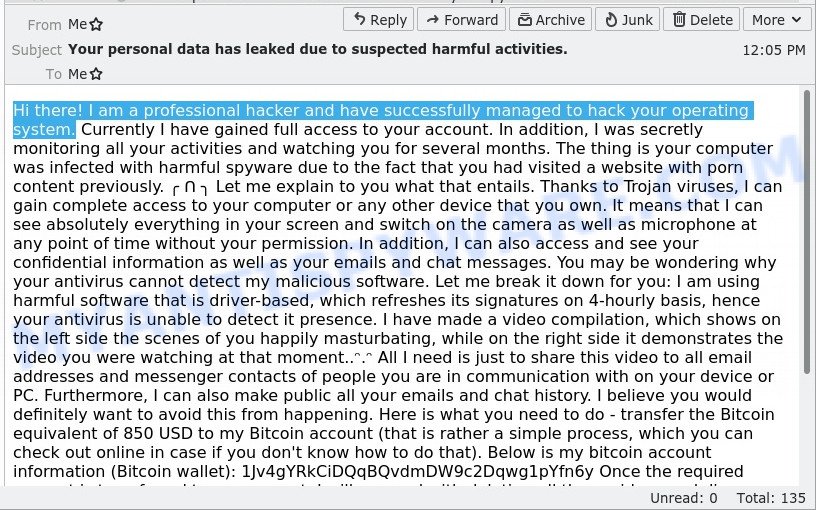
🔒 Your Private Information has been Stolen Email Scam
Here, the scammer will claim they’ve stolen sensitive information from you and threaten to release it unless you pay a ransom. They rely on the scare factor, hoping you’ll pay to protect your reputation, even though they likely have no data at all.
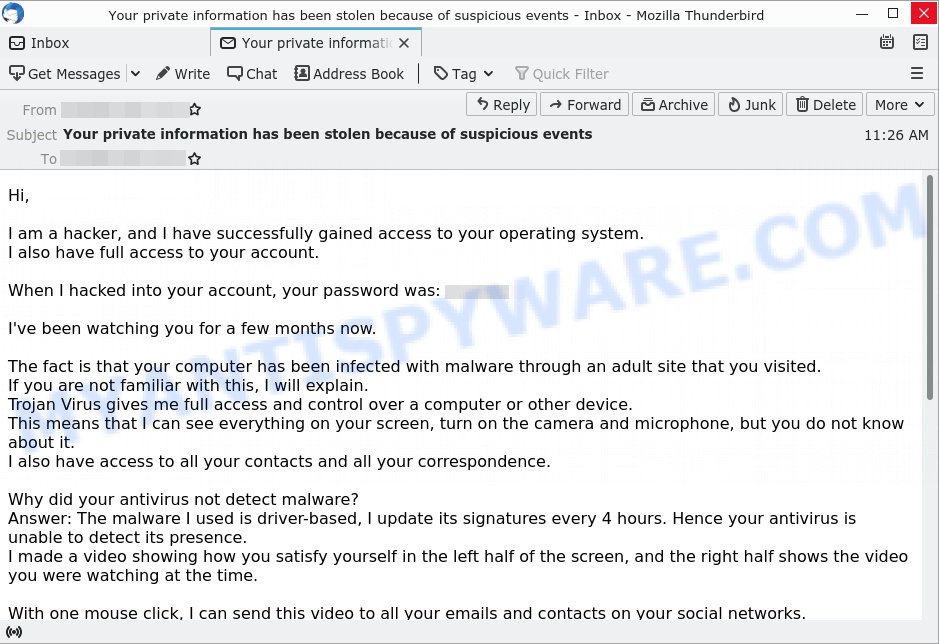
Each of these scams plays on fear and urgency to trick you into acting against your best interest. Always approach such emails with skepticism, verify your security, and do not engage with the scammers.
Should you send the money?
No, don’t give the scammer any money. It’s a scam, and giving them money will only encourage them to continue their criminal activities. Plus, if you pay once, they might target you again. To keep your personal information safe, always use strong and unique passwords for each of your accounts, enable two-factor authentication for an extra layer of security, and keep your computer’s antivirus software up to date. If you receive an email like this, it’s important to report it to the authorities and your email provider.
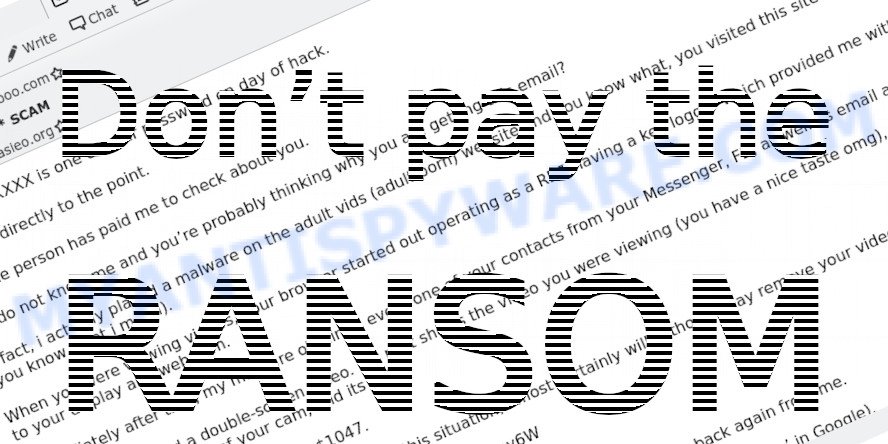
What to Do if You Receive the Email
Receiving an email that claims to have infected your computer with a RAT (Remote Administration Tool) malware can be alarming, but you can handle this situation calmly and safely.

Here’s a specific guide on handling this scam:
Begin by reminding yourself to stay calm. The email is crafted to elicit panic, pushing recipients into rash decisions. Recognize its true nature—a manipulative attempt to exploit fear.
Resist any impulses to pay. Even if you’re tempted to make the problem go away, understand that payment doesn’t guarantee safety. It merely emboldens the scammer, possibly marking you as an easy target for future deceptions.
Do not engage with the scammer. Replying or trying to open a dialogue can inadvertently give away more information, or signal that your email is active, making you a prime candidate for further scams.
Seeing a familiar password can be particularly jarring. If the scam email mentions a password you recognize, it’s essential to check its source. Use services like haveibeenpwned.com to see if your email or credentials have been compromised in any past data breaches.
Subsequent to that, update your passwords. Always choose strong, unique combinations and activate two-factor authentication on platforms that support it.
As a precaution, run a comprehensive security scan on your device. While the scam email’s claims about malware are usually baseless, this step ensures your system remains clean and threat-free.
Report the email to relevant authorities (e.g., FTC). Sharing details with your local law enforcement or cybercrime units can contribute to ongoing investigations and aid in the crackdown on such malicious activities.
Lastly, spread awareness. Inform friends, colleagues, and family about the scam, equipping them with the knowledge to recognize and sidestep such threats. Knowledge, shared and acted upon, diminishes the effectiveness of these scams, making the digital world a bit safer for everyone.
Threat Summary
| Name | ‘I infected you with a RAT’ Email Scam |
| Type | Phishing/Sextortion |
| Ransom amount | $900 USD (in Bitcoin equivalent) |
| Bitcoin Address | 1PRRyaqsRENEGjj9CtNeAJnqcQAYHzuPzr |
| Fake Claims | Compromised data, webcam access, malware/backdoor installed |
| Damage | Psychological distress, potential financial loss if ransom is paid |
| Distribution | Mass emailing, likely from a purchased or hacked email list |
| Tactics | Fear induction, urgency, deception |
| Variations | Different ransom amounts, varying email content, alternative cryptocurrencies for payment |
| Prevention Tips | Use strong, unique passwords; enable two-factor authentication; be skeptical of unsolicited emails; never pay ransoms |
| Reporting Info | Forward to the Anti-Phishing Working Group at reportphishing@apwg.org; Report the scam to relevant authorities (e.g., FTC); Share information about the scam with friends and family to raise awareness; Monitor online accounts for any suspicious activity |
Conclusion
The “I infected you with a RAT” email is a common scam that exploits fear to attempt to extort money from its recipients. These scammers falsely claim they’ve infected your computer with Remote Administration Tool (RAT) malware, leading you to believe your privacy has been breached. They often assert they have recorded you in compromising situations and threaten to share these non-existent recordings with your contacts, demanding a ransom, typically in Bitcoin. It is crucial to understand that these allegations are nearly always unfounded and are part of a scare tactic.
Bottom Line: Do not respond to these emails. The most effective defense is to disregard their threats and focus on enhancing your online security. 🛡️💻
Stay alert and use critical thinking; an email that immediately causes fear or appears too intricate is likely a scam. 🤔















